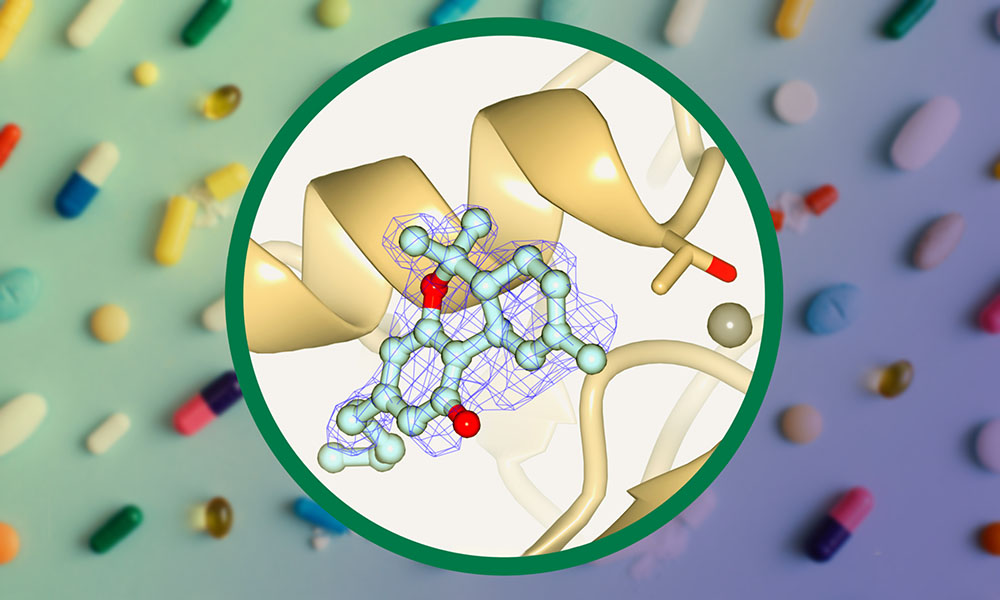A study of the European Molecular Biology Laboratory, published in Life Science Alliance demonstrated, through in vitro assays, that THC, as well as its derivative 9(R)-Δ6a,10a-THC (6a10aTHC) and also its precursor Tetrahydrocannabinolic acid (THCA), can inhibit the catalytic activity of an essential enzyme for the human being. This is autotaxin (ATX), which plays an important role in the development of cancer, inflammation, glaucoma or pulmonary fibrosis.
The research team from the European Molecular Biology Laboratory (EMBL) was also able, during their investigations, to determine the three-dimensional structure of THC when bound to autotaxin, through the use of crystallographic data.
Autotaxin is an enzyme that plays an important role in several important cellular functions in the human body, especially the production of the molecule called lysophosphatidic acid (LPA), which stimulates cell proliferation. A deregulation in the production of LPA can give rise to the development of cancer, inflammation or lung fibrosis.
In light of these new discoveries by the EMBL team, which form the molecular basis for explaining how THC interacts with autotaxin, the researchers suggest that THC may soon become a very attractive candidate for the development of drugs linked to pathologies caused by deregulation in the production of LPA by the body.
What is autotaxin?
It is an enzyme that is mainly responsible for the production of lysophosphatidic acid in the blood. The link between autotaxin and lysophosphatidic acid has been documented to be linked to and responsible for numerous physiological and pathological processes, including vascular and neurological development, neuropathic pain, as well as other immunodeficiency diseases such as cancer and multiple sclerosis. .
“Autotaxin is an essential enzyme in humans,” stated Mathias Eymery, PhD student on the McCarthy team and first author of the publication. “It is responsible for the production of LPA, an important membrane-derived lipid signaling molecule that mediates many different cellular functions. It is known that dysregulations of LPA production by autotaxin play a role in the development of cancer, inflammation, or pulmonary fibrosis”.
The endocannabinoid system (ECS) is another important signaling system in the human body, with receptors spread throughout the nervous system, both central and peripheral, and as explained by the researchers in their study, the broader ECS overlaps with other signaling pathways, including LPA and its receptors.
ECS, as we all know, is influenced by cannabis use, which introduces exogenous (external to the body) cannabinoids such as THC, CBD, CBG and all other cannabis phytocannabinoids into the human body. Given the existence of this overlap of the SEC and LPA signaling pathways, the researchers therefore set out to test whether cannabinoid compounds could also affect LPA signaling.
Autotaxin function can be inhibited by binding with THC
Through the validation of biochemical analyses, the team of researchers from EMBL evaluated the activity of two isoforms of autotaxin: autotaxin-beta (ATX-β) and autotaxin-gamma (ATX-γ), against a diverse variety of cannabinoids, such such as THC, THCA, 6a10aTHC (also known as delta-3 THC), CBD, and 5-DMH-CBD (a synthetic derivative of CBD) as well as the endocannabinoid anandamide (AEA) and 2-arachidonoylglycerol (2-AG ), and the synthetic cannabinoid JWH018.
THC and its derivative 6a10aTHC, showed signs of strong inhibition of the catalysis of each of the autotaxin isoforms during the tests. THCA also showed signs of inhibition, but to a lesser extent than the other two. The synthetic cannabinoid, JWH018 and the two endocannabinoids, anandamide and 2-AG, did not have any effects on the catalytic activity of autotaxin. CBD only weakly affected the ATX-β isoform and 5-DMH-CBD increased autotaxin inhibition when compared to CBD.
The research team also sought to investigate the interface between THC and autotaxin. Using crystallographic data, they were able to build a 3D model of the binding interfaces between both, thus confirming that both THC and 6a10aTHC have a good fit against the autotaxin active site.
Autotaxin inhibitors can help fight pathologies such as glaucoma and pulmonary fibrosis
Despite the findings made, the team of researchers was careful to point out that despite pointing to a strong inhibition of autotaxin catalysis by THC and similar cannabinoids in a vitro, it is still necessary to carry out further investigations and studies to confirm whether the same results apply live, when using cannabis.
However, he points out that LPA is already known to be present in human saliva and that autotaxin expression has also been detected in salivary gland tissues. And since cannabis is mostly consumed in its smoked form, they claim that cannabis smoke will certainly come into contact with saliva, and thus would certainly have the possibility of affecting ATX-LPA signaling. in vivo.
According to the research team, studying whether THC can inhibit autotaxin in vivo is relevant, since autotaxin inhibitors are already the subject of clinical trials and advanced research efforts. Studying this relationship between cannabis and autotaxin could also help the scientific and medical community to better understand the mechanisms behind the effects of using cannabis for medicinal and therapeutic purposes.
One example is the fact that it has recently been discovered that patients suffering from glaucoma tend to have elevated levels of autotaxin and LPA and that intraocular pressure (IOP), the main cause of glaucoma, can be reduced in animals. by being administered an autotaxin inhibitor. On the other hand, researchers in the field of cannabis have already observed that THC appears to reduce IOP in healthy individuals, but the mechanism behind this event was not very clear.
"Our data may explain the molecular basis of the therapeutic effect of medical cannabis in patients with glaucoma, as THC may reduce LPA formation by inhibiting ATX enzymatic activity," the researchers wrote in their study.
Several autotaxin inhibitors are currently being investigated as potential therapeutics for idiopathic pulmonary fibrosis. However, the Phase III clinical trial, titled ISABEL, which was intended to study the most advanced molecule that targets autotaxin, Ziritaxestat (Glpg1690) from Galápagos NV, was recently discontinued, due to the “risk-benefit profile no longer supporting the continuation of the study”. However, there is already a THC formulation, Dronabinol, approved by the Food and Drugs Administration (FDA), which is accepted for having a tolerable side effect profile.
"In this context, our observation that THC is a partial ATX inhibitor is of great interest, because this molecule is an FDA-approved drug, which could reduce LPA levels incompletely", add the investigators. "Furthermore, the fact that THC can cross the blood-brain barrier makes it an attractive candidate for treating neurological diseases," they concluded.










































